Omnibus Chinglish, part 2
« previous post | next post »
More fun with Chinglish examples from WeChat (see part 1 here).
Yantai

(source)
This one is all a matter of parsing (the Sinographic orthography is useless for that purpose; the Pinyin is crystal clear):
mièyān tái, not miè Yāntái
灭烟台
"ashtray" (lit., "stand for extinguishing cigarettes"
Yantai is a city of nearly seven million people on the Shandong coast.
The name Yantai (lit. "Smoke Tower") derives from the watchtowers constructed on Mount Qi in 1398 under the reign of the Hongwu Emperor of the Ming dynasty. The towers were used to light signal fires and send smoke signals, called langyan from their supposed use of wolf dung for fuel. At the time, the area was troubled by the Japanese pirates (Wokou), initially raiders from the warring states in Japan but later principally disaffected Chinese. It was also formerly romanized as Yen-tai.
(source)
POINT OF CONTENTION:
In years past, we often had vigorous discussions over whether intonation could override tone in Sinitic and other tonal languages (see "Selected readings" below for a partial bibliography of relevant posts). I'm a firm believer that it does, and that grammar, syntax, pauses, punctuation, emphasis, intended meaning, and other factors also have an impact on the actual pronunciation of utterances in Sinitic.
In the present case, I believe that "mièyān tái", is not pronounced exactly the same way as "miè Yāntái".
Mam
nán
男
"man; male"
Cf. Cantonese naam4, Hakka nàm, Minnan lâm, lam5 / nam5, Middle Sinitic /nʌm/, Old Sinitic /*nuːm/.
This is particularly hilarious because "Mam" reminds one of English "Ma'am".
Bibi who is high
bǐbǐ shéi gāo
比比谁高
"Let's see / compare who is taller".
It's not about Netanyahu.
Play and play
jìnzhǐ xīxì dǎnào
禁止嬉戏打闹
"It is prohibited to play around and be boisterous"
More to come!
Selected readings
- "A new kind of iron rice bowl" (7/29/18)
- "When intonation overrides tone, part 5" (9/25/20) — with a very long bibliography of posts on tones, intonation, pronunciation, etc.
- "Double positives, part 2" (5/28/22)
- "Cantonese intonation" (4/30/15)
- "Really?!" (12/27/16) — this is about English, but I'm certain that the same holds for Mandarin
- "Mair's hypothesis on tonal repetition" (7/6/21)
In general, look under Archive for Intonation to find scores of Language Log posts on this subject.



Andrew McCarthy said,
August 29, 2022 @ 6:05 pm
That first one has shades of Cato. Yantai delenda est!
Gad said,
August 29, 2022 @ 10:49 pm
I wonder! What would a Chinese look like that gave out half of the length of the characters that we had here?
Bob Ladd said,
August 30, 2022 @ 2:18 am
Concerning mièyān tái vs. miè Yāntái and VHM's contention that these would be pronounced differently, I offer a prediction about where the difference will lie.
In preparing lectures I gave (remotely) at the 8th Summer School of Contemporary Phonetics and Phonology in Beijing last month, I did some very limited and informal experimentation with similarly left-branching or right-branching three-character phrases with my colleague Jiayin Gao (高佳音). It's difficult to get minimal pairs, but an example of what we looked at was [[ 打字 ] 幕 ] dǎzìjī 'typewriter' vs. [ 打 [ 字机 ]] dǎ zìmū 'add subtitles'. The most obvious difference was that the second syllable was much (perhaps 30-40%) longer in right-branching phrases (here dǎ zìmū) than in left-branching phrases (here dǎzìjī), while the first and third syllables showed little difference. (An alternative way of stating what we observed is that the second syllable is longer if it is the first syllable of a sub-constituent than if it is the last syllable.)
This suggests that the place to look in mièyān tái vs. miè Yāntái is the duration of the syllable /yān/: it should be longer in Yāntái than in mièyān. That prediction agrees with what is left of any intuitions I have about Chinese pronunciation from my undergraduate days, but if somebody does the experiment properly I'd be very curious to know what you find.
Whether this difference is appropriately described as "intonation overriding tone" (VHM's formulation) is certainly open to discussion, but the existence of a consistent phonetic difference seems very likely.
Bob Ladd said,
August 30, 2022 @ 2:21 am
Sorry, I got the hanzi versions of "dǎzìjī" and "dǎ zìmū" reversed in my comment above. Been a long time since I had any serious familiarity with hanzi. Sigh.
Victor Mair said,
August 30, 2022 @ 4:51 am
@Bob Ladd
Thank you for helping us put the discussion on a scientific footing.
klu9 said,
August 30, 2022 @ 12:37 pm
"This is particularly hilarious because "Mam" reminds one of English "Ma'am"."
Or even English "mam": https://en.wiktionary.org/wiki/mam#English
Ling said,
September 1, 2022 @ 2:33 pm
灭烟台 reminds me of 潍坊 Weifang and 威海 Weihai, also cities in Shandong. Rihanna's We Found Love and Where Have You Been were purposely translated as 'Weifang de ai' 潍坊的爱 (love in Weifang) and 'Weihai youbing 威海油饼 (Weihai deep-fried pancake) by netizens. Rihanna was thus dubbed 'Diva of Shandong' :)